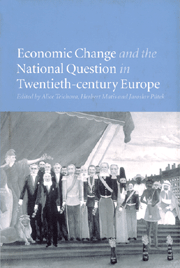Book contents
- Frontmatter
- Contents
- List of figures
- List of tables
- Notes on contributors
- Acknowledgements
- Introduction
- 1 Nationalism and the economic question in twentieth-century Ireland
- 2 Economic aspects of the nationality problem in nineteenth- and twentieth-century Belgium
- 3 The economy as a pushing or retarding force in the development of the German question during the second half of the twentieth century
- 4 Lusatian Sorbs in Germany before the Second World War: the influence of the economy on the national question
- 5 Unequal regional development in Switzerland: a question of nationality?
- 6 The Portuguese national question in the twentieth century: from Spanish threat to European bliss
- 7 From autarky to the European Union: nationalist economic policies in twentieth-century Spain
- 8 The economic background to the Basque question in Spain
- 9 Economic change and nationalism in Italy in the twentieth century
- 10 National integration and economic change in Greece during the twentieth century
- 11 National identity and economic conditions in twentieth-century Austria
- 12 Economic, social and political aspects of multinational interwar Czechoslovakia
- 13 Nationality and competition: Czechs and Germans in the economy of the First Czechoslovak Republic (1918–1938)
- 14 Economic aspects of Slovak national development in the twentieth century
- 15 Economic change and national minorities: Hungary in the twentieth century
- 16 Economic background to national conflicts in Yugoslavia
- 17 Economic differentiation and the national question in Poland in the twentieth century
- 18 Economy and ethnicity in the hands of the state: economic change and the national question in twentieth-century Estonia
- 19 Changing structure and organisation of foreign trade in Finland after Russian rule
- 20 Economic change and the national question in twentieth–century USSR/Russia: the enterprise level
- Index
2 - Economic aspects of the nationality problem in nineteenth- and twentieth-century Belgium
Published online by Cambridge University Press: 01 September 2009
- Frontmatter
- Contents
- List of figures
- List of tables
- Notes on contributors
- Acknowledgements
- Introduction
- 1 Nationalism and the economic question in twentieth-century Ireland
- 2 Economic aspects of the nationality problem in nineteenth- and twentieth-century Belgium
- 3 The economy as a pushing or retarding force in the development of the German question during the second half of the twentieth century
- 4 Lusatian Sorbs in Germany before the Second World War: the influence of the economy on the national question
- 5 Unequal regional development in Switzerland: a question of nationality?
- 6 The Portuguese national question in the twentieth century: from Spanish threat to European bliss
- 7 From autarky to the European Union: nationalist economic policies in twentieth-century Spain
- 8 The economic background to the Basque question in Spain
- 9 Economic change and nationalism in Italy in the twentieth century
- 10 National integration and economic change in Greece during the twentieth century
- 11 National identity and economic conditions in twentieth-century Austria
- 12 Economic, social and political aspects of multinational interwar Czechoslovakia
- 13 Nationality and competition: Czechs and Germans in the economy of the First Czechoslovak Republic (1918–1938)
- 14 Economic aspects of Slovak national development in the twentieth century
- 15 Economic change and national minorities: Hungary in the twentieth century
- 16 Economic background to national conflicts in Yugoslavia
- 17 Economic differentiation and the national question in Poland in the twentieth century
- 18 Economy and ethnicity in the hands of the state: economic change and the national question in twentieth-century Estonia
- 19 Changing structure and organisation of foreign trade in Finland after Russian rule
- 20 Economic change and the national question in twentieth–century USSR/Russia: the enterprise level
- Index
Summary
INTRODUCTION
The tensions between Dutch- and French-speakers in Belgium have a long history. Even before the creation of the Belgian state in 1830, we already find traces of linguistic controversies. The political aspects of this conflict have been the subject of much scholarly research and argument. The impact of economic developments on the issue, however, has received far less attention. Economists started a debate in the late 1970s about the magnitude of the financial transfers between Flanders and Wallonia. Most of these analyses take 1975 as a starting point, which is, for a historical economist, a very short time horizon. Moreover, the link between shifts in relative economic performance and its effect on the political bargaining power of the two linguistic groups is rarely taken explicitly into consideration.
The goal of this chapter is to analyse long-term changes in the economic structure of Flanders and Wallonia from the second half of the nineteenth century to the present day. It will be demonstrated that changes in the relative economic performance of both regions affected profoundly their bargaining power in political issues.
THE NINETEENTH CENTURY
The official linguistic census of 1846 indicated clearly that a majority (57 per cent) of the Belgian population used Dutch as its mother tongue. Moreover, the census showed that the two linguistic groups were confined to specific areas: Dutch was spoken in the north of the country (Flanders) and French in the south (Wallonia). Brussels and its suburbs took up a somewhat unusual position.
- Type
- Chapter
- Information
- Publisher: Cambridge University PressPrint publication year: 2000



